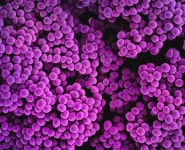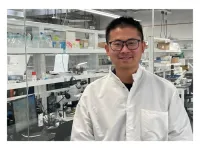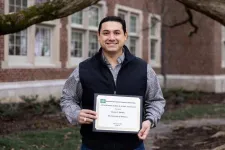(Press-News.org) Antibiotics are powerful, fast-acting medications designed to eradicate bacterial infections. However, in recent years, their dependability has waned as antibiotic resistant bacteria continues to evolve and spread.
Staphylococcus aureus is a leading cause of antibiotic resistance associated infections and deaths. It is also the most prevalent bacterial infection among those with diabetes mellitus, a chronic condition that affects blood sugar control and reduces the body’s ability to fight infections.
Microbiologists Brian Conlon, PhD, and Lance Thurlow, PhD, at the UNC School of Medicine have just shown that people with diabetes are more likely to develop antibiotic-resistant strains of Staph, too. Their results, which were published in Science Advances, show how the diabetic microbial environment produces resistant mutations, while hinting at ways antibiotic resistance can be combatted in this patient population.
“We found that antibiotic resistance emerges much more rapidly in diabetic models than in non-diabetic models of disease,” said Conlon, associate professor at the Department of Microbiology and Immunology. “This interplay between bacteria and diabetes could be a major driver of the rapid evolution and spread of antibiotic resistance that we are seeing.”
Diabetes affects the body’s ability to control a type of sugar called glucose, often causing excess glucose to build up in the bloodstream. Staph feeds off these high sugar levels, allowing it to reproduce more rapidly. The bacterium can also grow without consequence, as diabetes also impairs the immune system’s ability to destroy cells and control infection.
As the numbers of bacteria increase in a diabetic infection, so does the likelihood of resistance. Random mutations appear and some build up resistance to external stressors, like antibiotics. Once a resistant mutant is present in a diabetic infection, it rapidly takes over the population, using the excess glucose to drive its rapid growth.
“Staphylococcus aureus is uniquely suited to take advantage of this diabetic environment,” said Thurlow, assistant professor of microbiology and immunology, with joint appointments in the UNC School of Medicine and the Adams School of Dentistry. “Once that resistant mutation happens, you have excess glucose and you don't have the immune system to clear the mutant and it takes over the entire bacterial population in a matter of days.”
Conlon, an expert on antibiotic treatment failure, and Thurlow, an expert on Staph pathogenesis in diabetes, have long been interested in comparing the effectiveness of antibiotics in a model with and without diabetes. Using their connections within the Department of Microbiology and Immunology, the researchers brought their labs together to perform a study with antibiotics in a diabetic mouse model of S. aureus infection.
First, the team prepared a mouse model with bacterial infection in the skin and soft tissue. The mouse models were divided into two groups: one half was given a compound that selectively kills cells in the pancreas, rendering them diabetic, and the other half was not given the compound. Researchers then infected both diabetic and non-diabetic models with S. aureus and treated them with rifampicin, an antibiotic where resistance evolves at a high rate.
After five days of infection, it was time to observe the results.
Conlon and Thurlow were quick to notice that the rifampicin had practically no effect in diabetic models. So, they took some samples to investigate. Researchers were shocked to find that the bacteria had evolved to become resistant to rifampicin, with the infection harboring over a hundred million rifampicin resistant bacteria. There were no rifampicin resistant bacteria in the non-diabetic models.
And, even more surprisingly, the mutation had taken over the entire infection in just four days. They next inoculated diabetic and non-diabetic models with Staphylococcus aureus as before, but this time supplemented with a known number of rifampicin resistant bacteria. Again, these bacteria rapidly took over the diabetic infection, but remained as only a sub-population in non-diabetic models after 4 days rifampicin treatment.
Their new findings have left Conlon and Thurlow with many questions; however, they are certain that the evolution of antibiotic resistance in people with diabetes could spell trouble for the population at large. Antibiotic-resistant strains of bacteria spread from person to person in the same ways as other bacteria and viruses do – in the air, on doorknobs, and the food that we eat – which makes preventing these types of infections a major priority.
So, what can be done to prevent it? Well, the Conlon and Thurlow labs showed that reducing blood sugar levels in diabetic models (through administration of insulin) deprived bacteria of their fuel, keeping their numbers at bay, and reducing the chances of antibiotic-resistant mutations from occurring. Their findings suggest that controlling blood sugar through insulin use could be key in preventing antibiotic resistance.
“Resistance and its spread are not only associated with the prescription of drugs, but also the health status of those that are taking antibiotics,” said Conlon. “Controlling blood glucose then becomes really important. When we gave our mice insulin, we were able to bring their blood sugar back to normal and we didn't get this rapid proliferation of resistant bacteria.”
Now, Conlon and Thurlow are expanding their efforts to study the evolution of resistance in humans (with and without diabetes) and other antibiotic-resistant bacteria of interest, including Enterococcus faecalis, Pseudomonas aeruginosa, and Streptococcus pyogenes. Recognizing how large a role the host plays a role in the evolution of antibiotic resistance, the researchers plan to perform similar studies in patients undergoing chemotherapy and recent transplant recipients to see if those populations are also prone to antibiotic resistant infections.
END
Diabetes can drive the evolution of antibiotic resistance
2025-02-12
ELSE PRESS RELEASES FROM THIS DATE:
ChatGPT has the potential to improve psychotherapeutic processes
2025-02-12
When it comes to comparing responses written by psychotherapists to those written by ChatGPT,the latter are generally rated higher, according to a study published February 12, 2025, in the open-access journal PLOS Mental Health by H. Dorian Hatch, from The Ohio State University and co-founder of Hatch Data and Mental Health, and colleagues
Whether machines could be therapists is a question that has received increased attention given some of the benefits of working with generative artificial intelligence (AI). Although previous research has found that humans ...
Prioritise vaccine boosters for vulnerable immunocompromised patients and prevent emergence of new COVID variants, say scientists
2025-02-12
Vaccinations alone may not be enough to protect people with compromised immune systems from infection, even if the vaccine has generated the production of antibodies, new research from the University of Cambridge has shown.
The findings, published today in Science Advances, suggest that such individuals will need regular vaccine boosters to protect them and reduce the risk of infections that could be severe and also lead to new ‘variants of concern’ emerging.
Almost 16 million people worldwide are estimated ...
California's most economically and culturally important species among those most vulnerable to projected climate change
2025-02-12
California's most economically and culturally important species among those most vulnerable to projected climate change, per Climate Vulnerability Assessment of 34 marine species.
###
Article URL: https://plos.io/4gslT5s
Article Title: A collaborative climate vulnerability assessment of California marine fishery species
Author Countries: U.S.
Funding: This work was funded by a grant from the Resource Legacy Fund (#15067). Though the funders helped determine the project's initial scope of work, they had no role in data collection and analysis, the decision to publish, or the preparation of the manuscript. END ...
Scientists develop novel self-healing electronic skin for health monitoring
2025-02-12
Los Angeles, CA – February 12, 2025—Researchers have achieved a breakthrough in wearable health technology by developing a novel self-healing electronic skin (E-Skin) that repairs itself in seconds after damage. This could potentially transform the landscape of personal health monitoring.
In a study published in Science Advances, scientists demonstrate an unprecedented advancement in E-Skin technology that recovers over 80% of its functionality within 10 seconds of being damaged – a dramatic improvement over existing technologies that can take minutes or hours to heal.
The technology seamlessly combines ultra-rapid self-healing capabilities, reliable ...
Models show intensifying wildfires in a warming world due to changes in vegetation and humidity; only a minor role for lightning
2025-02-12
Extreme fire seasons in recent years highlight the urgent need to better understand wildfires within the broader context of climate change. Under climate change, many drivers of wildfires are expected to change, such as the amount of carbon stored in vegetation, rainfall, and lightning strikes. Quantifying the relative importance of these processes in recent and future wildfire trends has remained challenging, because previous climate computer model simulations did not capture the full coupling between climate change, lightning, wildfires, smoke and corresponding shifts in solar ...
Unraveling the complex role of climate in dengue dynamics
2025-02-12
The research team led by KIM Jae Kyoung, Professor in the Department of Mathematical Sciences at KAIST and Chief Investigator of the Biomedical Mathematics Group at the Institute for Basic Science (IBS), has unveiled new insights into how weather influences the spread of dengue fever. Their study identifies temperature and rainfall as critical factors driving the global surge in dengue cases and offers actionable strategies for mitigating the disease's impact.
Dengue fever, a mosquito-borne disease, poses an increasingly alarming public health challenge. According to the World Health Organization, reported dengue cases surged from 4.1 ...
INSEAD celebrates five years of impact in North America during its second Americas Conference 2025
2025-02-12
INSEAD, The Business School for the World, celebrated five years of impact of its San Francisco Hub for Business Innovation during its second Americas Conference 2025 on 7-8 February.
Over 250 business leaders, government officials, INSEAD alumni, faculty, and staff convened for insightful and lively conversations centered around the theme: ‘The Future is Now: Bridging Business, Technology, and Humanity’.
The central question driving all the debates was: How can we harness the incredible potential of AI while prioritizing the well-being of humanity. Key themes that emerged included the ability for leaders to see beyond AI hype, a need to embrace disruption, ...
MAGE-4 promotes tumor progression by halting antitumor responses
2025-02-12
A study published in Science Advances reveals a novel strategy that allows tumors to evade the body’s immune response critical for their elimination. Researchers at Baylor College of Medicine and collaborating institutions discovered in a mouse model of non-small cell lung cancer that tumors that express protein MAGE-4 and have lost the Pten gene, a tumor suppressor, accelerate their development and progression into metastasis. In the mouse model and human tumor samples, MAGE-4 drives the accumulation of plasma immune cells that suppress antitumor immunity. The study points at novel potential therapeutic ...
Economically, culturally important marine species vulnerable to changing climate, new study shows
2025-02-12
Dungeness crab, Pacific herring, and red abalone are among the marine species most vulnerable to the changing climate's effect on California's coastal waters, a new study led by UC Santa Cruz researchers finds. In a paper published on February 12 in the journal PLOS Climate, the team seeks to help the California Department of Fish and Wildlife (CDFW) in its efforts to develop and implement climate-ready fisheries management strategies that adapt to challenges such as rising ocean temperatures, acidification, and deoxygenation.
The study, "A Collaborative Climate Vulnerability Assessment of California Marine Fishery Species," was led by Timothy Frawley, an assistant ...
Tennessee professor receives SAEA Emerging Scholar Award
2025-02-12
Charles Martinez, assistant professor and Extension specialist in the Department of Agricultural and Resource Economics at the University of Tennessee Institute of Agriculture, recently received the Emerging Scholar Award from the Southern Agricultural Economics Association (SAEA). The award is presented to high-performing, early-career professionals with demonstrated research and resulting publication activity.
Martinez was chosen among peers nationwide for this distinguished honor. He received the award February 3 during the annual SAEA meeting in Irving, Texas.
“In a short time, Dr. Martinez has established himself as ...









